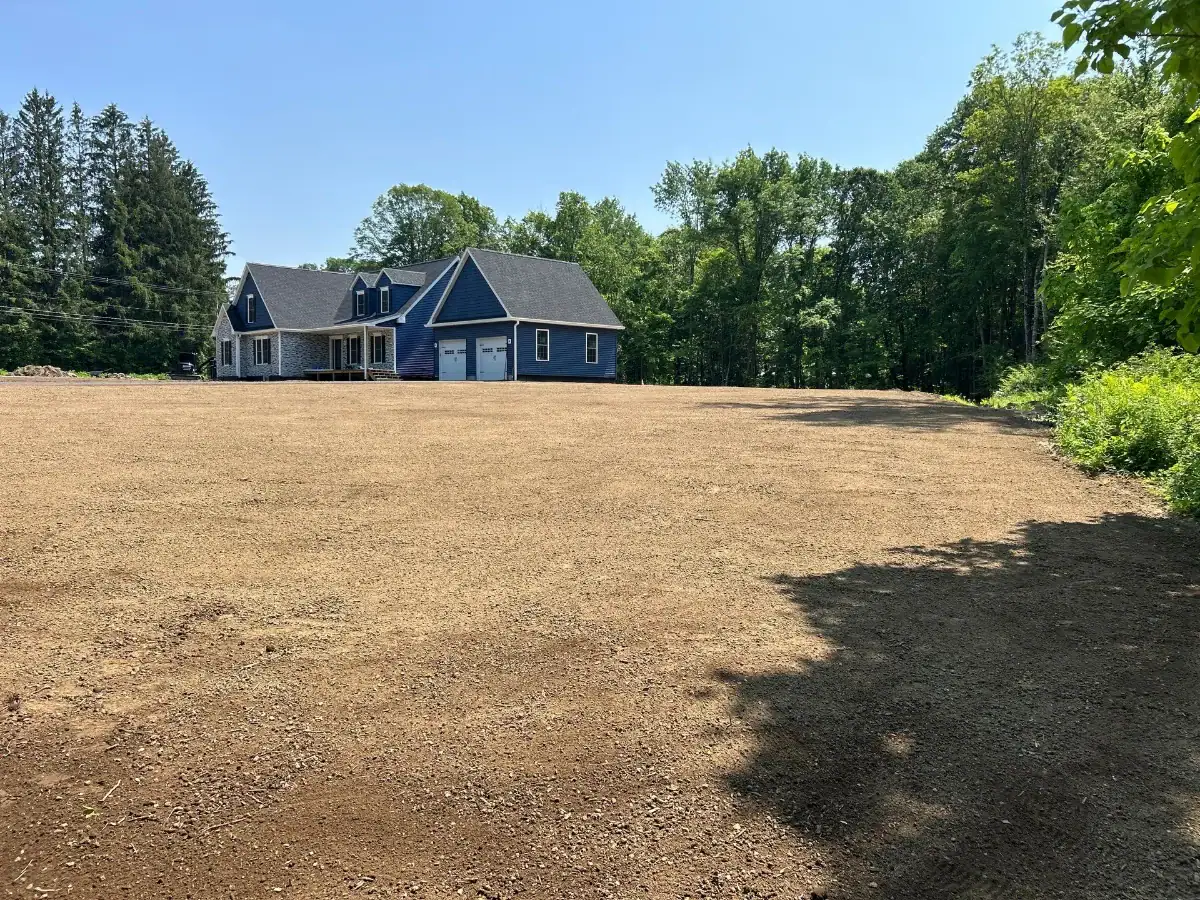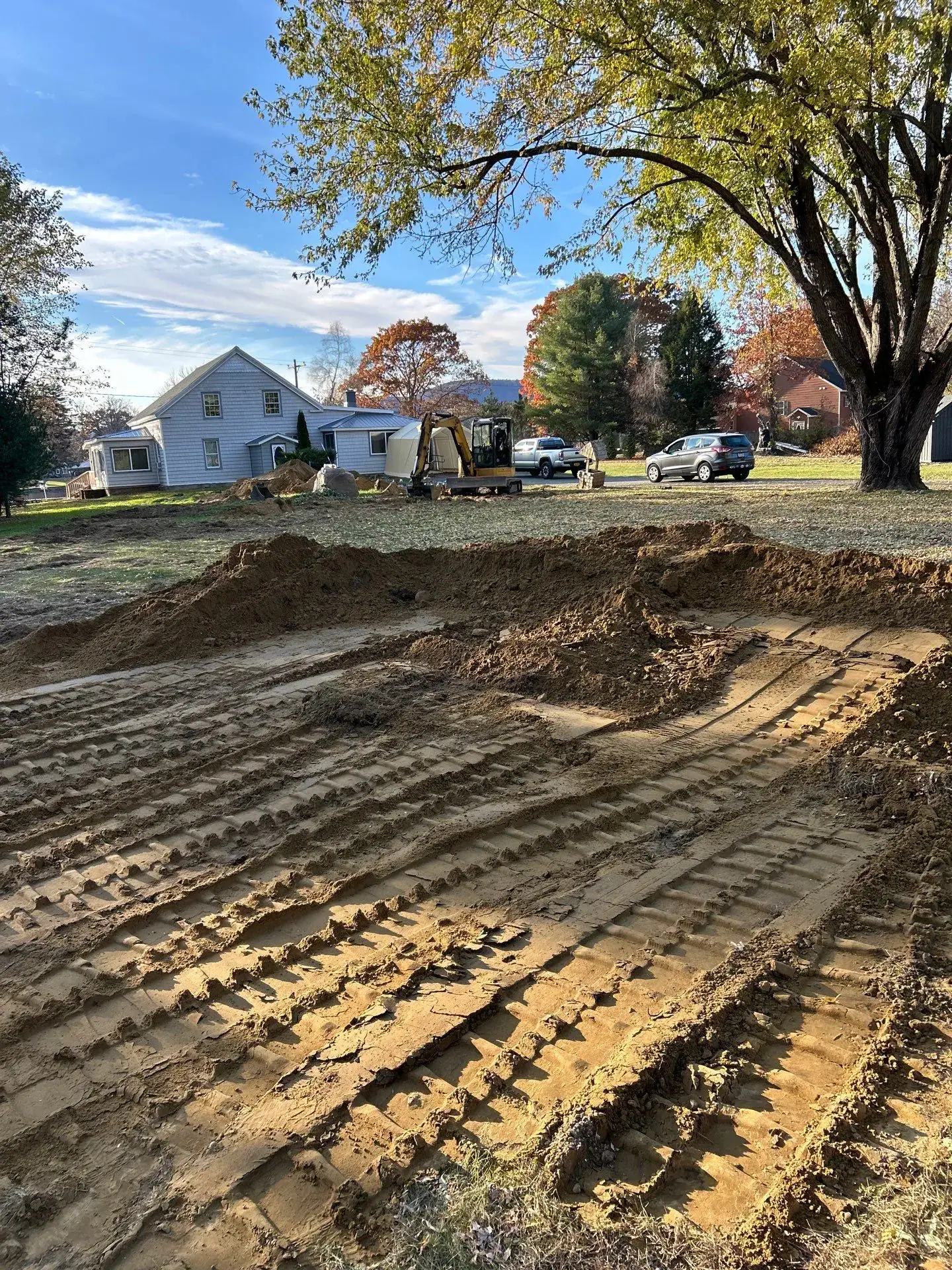Residential and commercial excavation differ significantly in scope, equipment, and complexity. Understanding these differences helps you choose the right contractor.
Share:

Summary:
Residential excavation focuses on projects around your home or personal property in Saratoga County, NY. Think septic system installation, foundation work for additions, driveway grading, or land clearing for a new house.
These projects typically involve smaller equipment and shorter timeframes. A residential septic system excavation might take a few days, while clearing a lot for a new home could wrap up in a week or two.
The scale is manageable, but the precision requirements are just as demanding as any commercial job. Your home’s foundation or septic system needs to be done right the first time.

Residential excavation covers a surprisingly wide range of work throughout Saratoga County. Septic system excavation is probably the most common—and most critical—residential excavation service in our area, where many properties rely on individual septic systems rather than municipal sewer connections.
Your septic tank needs precise placement and proper grading to function correctly for decades. The excavation must account for soil conditions, water table levels, and local setback requirements. A standard residential septic tank measures roughly 4.5 feet wide, 8 feet long, and 6 feet tall, requiring careful excavation to ensure proper installation depth. The drainfield typically covers 375-500 square feet and requires specific soil conditions to function properly.
Foundation excavation for home additions or new construction is another major residential service. This work demands accuracy because your foundation’s stability depends on proper soil preparation and grading. Poor excavation here can lead to settling, water issues, or structural problems that cost thousands to repair later.
Driveway installation, land clearing, and site preparation round out most residential excavation needs. Whether you’re creating access to a new home site or improving an existing driveway, the excavation work sets the foundation for everything that follows. In Saratoga County’s varied terrain, proper grading prevents drainage issues that plague poorly planned driveways.
Residential excavation projects move at a different pace than commercial work. Most residential jobs can be completed within days or weeks, depending on scope and weather conditions. This faster timeline often works better for homeowners who want to minimize disruption to their daily lives.
A typical septic system excavation and installation might take 2-3 days from start to finish, including site preparation, excavation, tank installation, and backfilling. Foundation excavation for a home addition could take a week, including site preparation and final grading. Land clearing for a residential lot usually wraps up in 3-5 days, assuming normal soil conditions and no major obstacles like ledge or extensive root systems.
The equipment we use for residential work is scaled appropriately for suburban and rural properties. Compact excavators, smaller bulldozers, and standard dump trucks handle most residential projects efficiently. This smaller equipment can navigate residential properties without damaging existing landscaping, driveways, or structures.
However, don’t mistake smaller equipment for less capability. Modern compact excavators can handle surprisingly demanding work while fitting through standard gate openings and working in tight spaces around your home. They’re also easier on your lawn and landscaping than larger commercial equipment.
Cost considerations for residential work typically range from a few thousand dollars for simple grading work to $15,000-25,000 for complete septic system installation, depending on soil conditions and system complexity.
Want live answers?
Connect with a Emerson Excavating and Trucking expert for fast, friendly support.
Commercial excavation operates on an entirely different level. These projects involve larger sites, more complex requirements, and significantly longer timelines that can stretch from weeks to months.
Commercial work includes everything from retail developments and office buildings to industrial facilities and municipal infrastructure. The excavation might involve moving thousands of cubic yards of soil, installing extensive utility systems, or preparing sites for massive structures.
The complexity increases exponentially with commercial projects, requiring detailed planning, specialized equipment, and experienced crews who understand the coordination required for large-scale construction.

Commercial excavation projects start with extensive site evaluation and engineering studies. We must consider soil conditions, environmental regulations, utility locations, and drainage requirements across much larger areas—sometimes spanning multiple acres in Saratoga County’s growing commercial districts.
A commercial development might require excavation for multiple buildings, parking areas, stormwater management systems, and utility corridors all within a single project. Each component must be coordinated with other trades and meet specific engineering specifications that residential projects rarely encounter.
Environmental considerations play a larger role in commercial work. Stormwater management becomes critical when you’re dealing with large areas of impervious surfaces like parking lots and buildings. Commercial sites often require sophisticated drainage systems, retention ponds, and careful soil handling to meet state and local environmental regulations.
The permitting process for commercial excavation is also more involved. Multiple agencies may need to approve plans, and inspections occur at various stages throughout the project. In Saratoga County, this might involve coordination with town planning boards, the county health department, and state environmental agencies.
Utility coordination becomes exponentially more complex. Commercial sites typically require multiple utility services—electric, gas, water, sewer, telecommunications, and sometimes specialized services. Each utility has specific requirements for depth, separation, and access that must be coordinated during excavation.
Commercial excavation demands heavy-duty equipment capable of moving large volumes of material efficiently. Large excavators, bulldozers, articulated dump trucks, and specialized equipment like GPS-guided grading systems are standard on commercial sites. This equipment can cost hundreds of thousands of dollars and requires experienced operators.
The timeline for commercial excavation projects extends from weeks to months, depending on project size and complexity. A small commercial building might require 2-3 weeks of excavation work, while a large retail development could take several months to complete all excavation and site preparation work.
Weather plays a bigger factor in commercial timelines because of the extended duration and larger exposed areas. We must plan for seasonal variations and have contingency plans for weather delays. In Saratoga County, this means accounting for winter conditions that can halt excavation work for extended periods.
The coordination requirements also increase significantly. We work closely with general contractors, utility companies, engineers, and project managers to ensure work proceeds in the proper sequence. This coordination is essential because delays in excavation can cascade through the entire construction schedule, potentially costing thousands of dollars per day.
Quality control becomes more rigorous on commercial projects. Compaction testing, grade verification, and material certification are standard requirements that add time and cost but ensure the final product meets engineering specifications.
Whether your project is residential or commercial, choosing the right excavating contractor makes all the difference between a smooth project and a costly headache. Look for contractors with specific experience in your type of project and the proper equipment to handle your scope of work efficiently.
Local knowledge matters tremendously in Saratoga County. We’re familiar with local soil conditions, seasonal challenges, and permit requirements, which allows us to navigate potential issues before they become expensive problems. We understand how our area’s varied terrain and weather patterns affect excavation work and can plan accordingly.
For your next excavation project, whether it’s a residential septic system or a commercial development, Contact Emerson Excavating and Trucking to discuss your specific needs and get expert guidance from experienced local professionals who understand the difference.
Article details:
Share:
Ready to Start Your Project Right?
Get a straightforward quote for your excavation, aggregate, or dumpster rental needs. No pressure, just honest answers and reliable service from local professionals who understand your area.
Emerson Excavating and Trucking
Company
Support
Useful Links